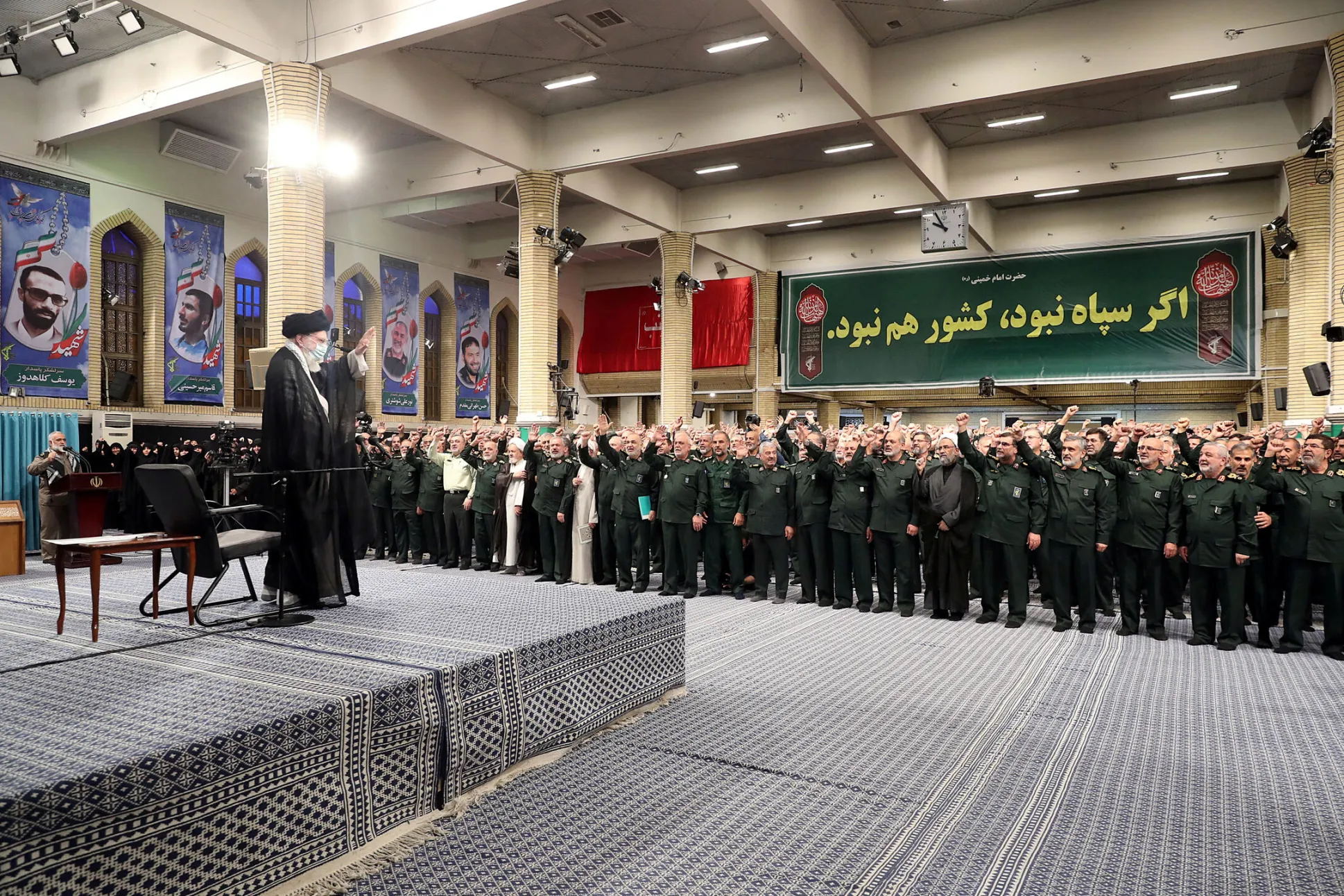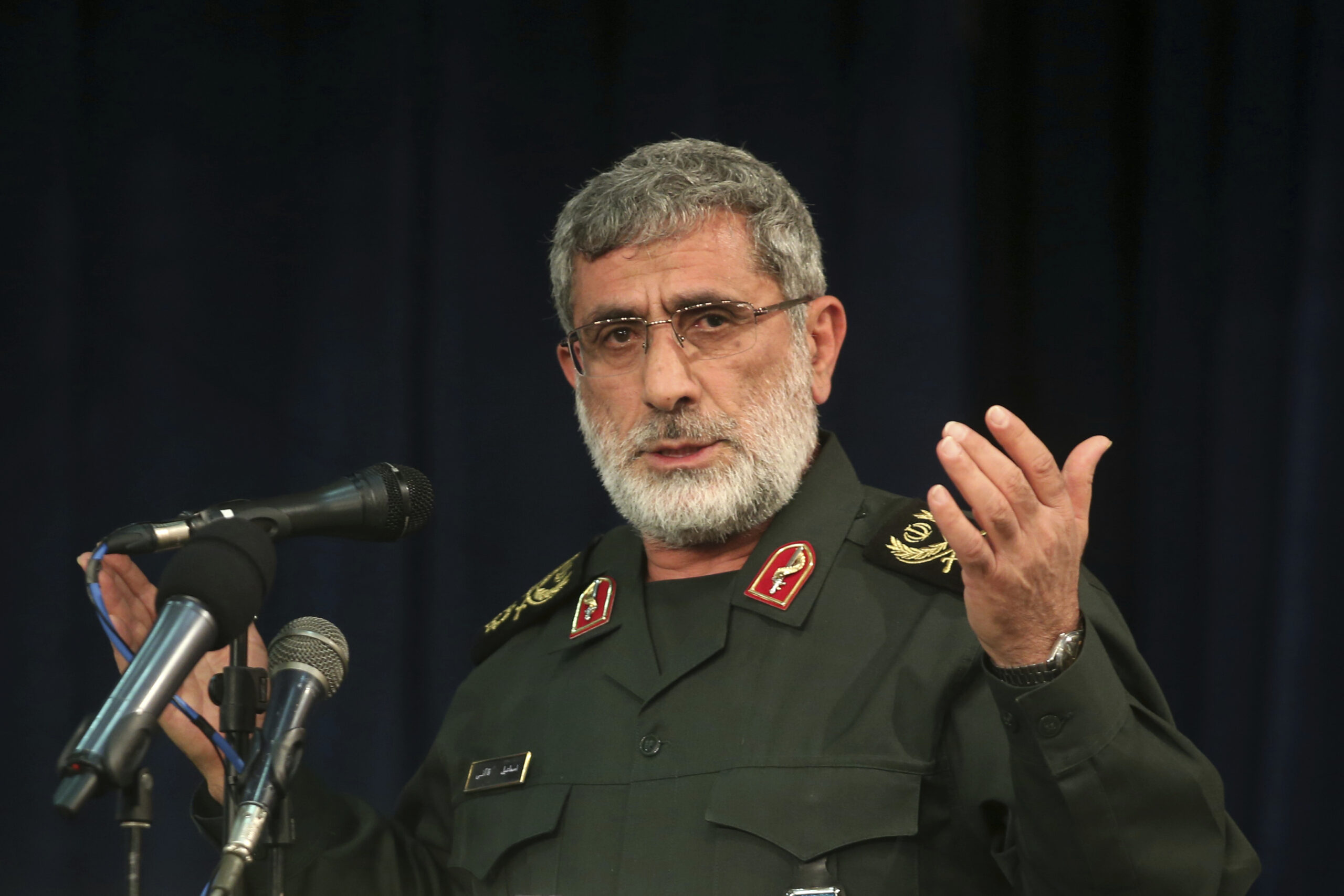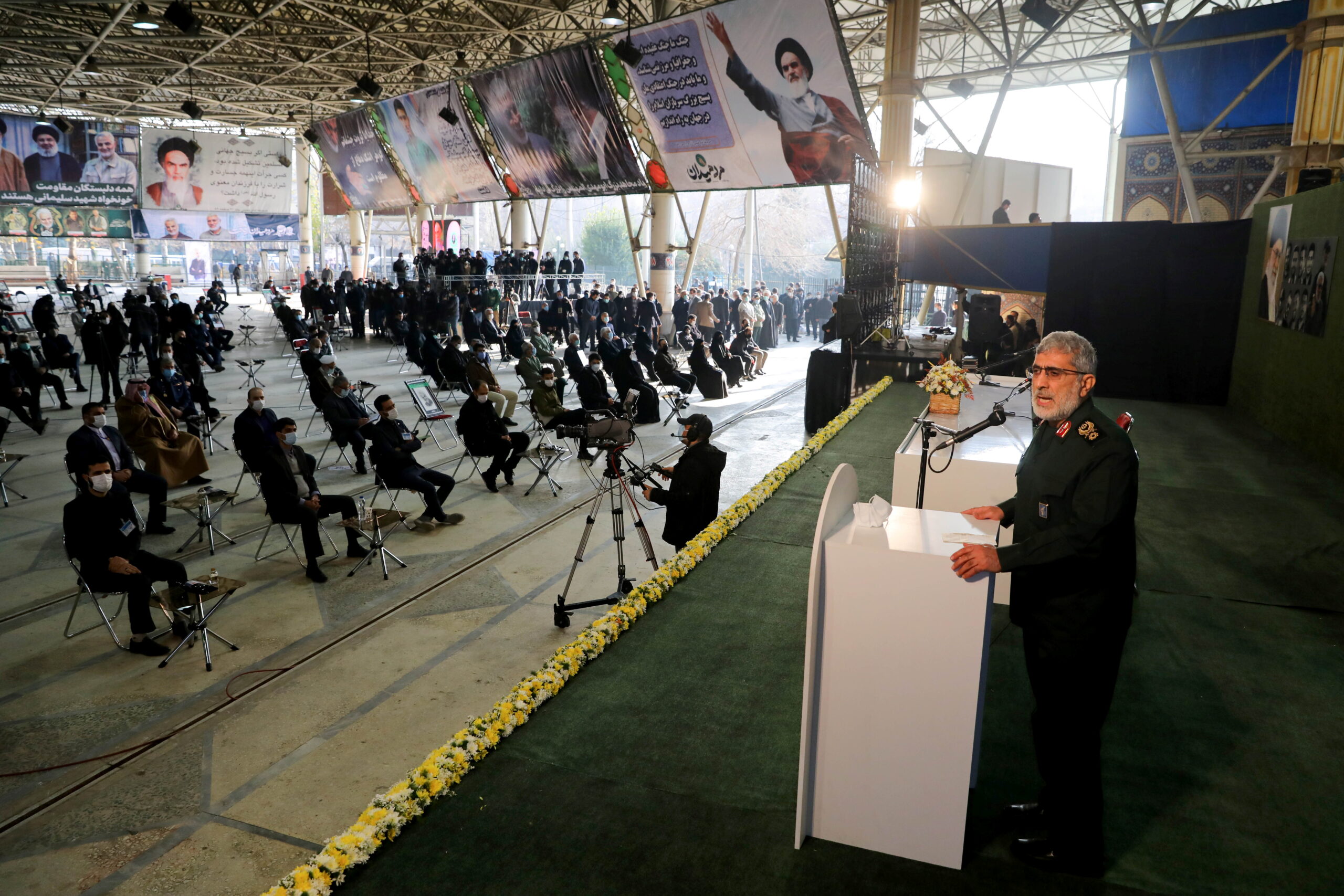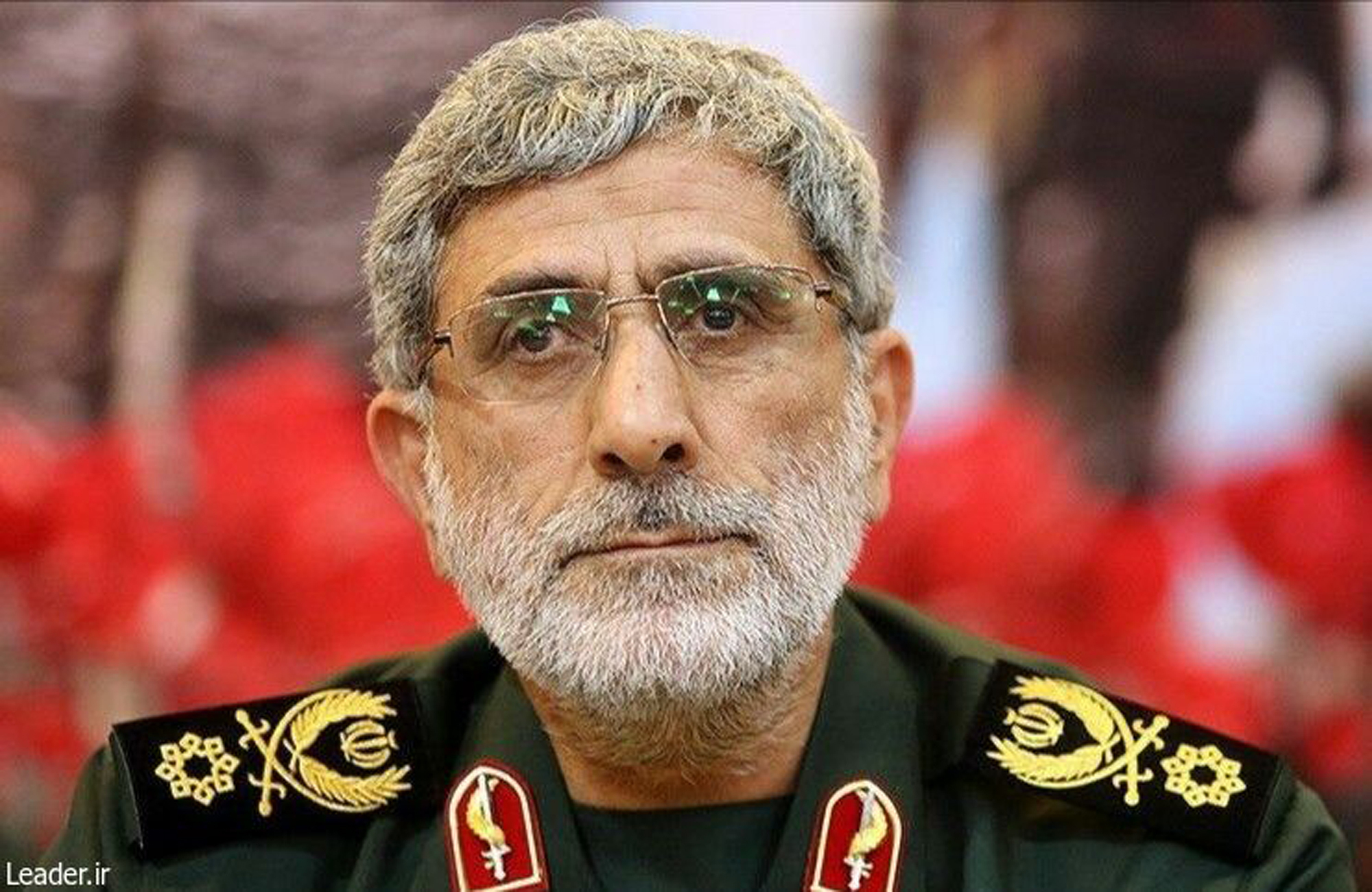Obscure Track Record of Quds Force Deputy Fallahzadeh
Quds Force chief Brigadier General Ismail Qaani is likely to be succeeded by his deputy, but the role Brigadier General Mohammad Reza Fallahzadeh currently plays in the organization remains obscure.

Following the January 3, 2020 assassination of Major General Qassim Suleimani, the Quds Force chief was succeeded by his deputy, Brigadier General Ismail Qaani. It is therefore likely that Qaani himself will be succeeded by his deputy, Brigadier General Mohammad Reza Fallahzadeh. While Fallahzadeh’s biography provides some information on his past, there is no account of his performance as Quds Force deputy. A survey of 47 references to Fallahzadeh in Persian-language open sources since his appointment as Quds Force deputy provides very limited insight into his track record as deputy and next to no insights into his role in the ongoing war in Gaza.
Fallahzadeh was appointed Quds Force deputy on April 19, 2021, following the passing of Brigadier General Mohammad Hosseinzadeh Hejazi, whose health was compromised due to exposure to chemical weapons during the war with Iraq in the 1980s. A veteran of the 1980-88 Iran-Iraq War, Fallahzadeh’s career largely resembles that of his predecessor’s, but around 2013-14, he was deployed to Syria, where he was reportedly “one of five main commanders” of the Islamic Revolutionary Guard Corps leading the 2014-16 battle of Aleppo. Fallahzadeh’s service in Syria was cut short when he was wounded in combat in April 2016, but he recovered and was promoted to brigadier general and appointed chief of staff of the Quds Force in 2019. At Fallahzadeh’s promotion ceremony, Supreme Leader Ayatollah Ali Khamenei reportedly said: “I have you on my mind in my nightly prayers. Fortunate is the defender of the shrine.” Fallahzadeh’s fast-track promotion was reflective of the rise of veterans of the civil war in Syria within the ranks of the IRGC.
Prior to his appointment as Quds Force deputy, Fallahzadeh actively promoted himself in Iran’s state-censored media, particularly the Islamic Republic of Iran Voice and Vision. Since his appointment, his public presence has been somewhat reduced. He no longer appears on television, and most references to him in the media are quotes from his public statements at IRGC gatherings. One exception, however, was a December 22, 2023 interview with the Yemeni Houthi movement’s Al-Masirah television.
The survey of the Persian-language open sources further shows that Fallahzadeh has only taken one foreign trip in his capacity as Quds Force deputy, which took him to Moscow on April 25, 2023, where he reportedly participated in a conference on the future of Syria alongside the Russian defense minister. This stands in stark contrast to Qaani, who reportedly made 26 visits abroad between January 3, 2020 and October 3, 2023.
Within Iran, 20 out of 38 reports mentioning Fallahzadeh’s location place him in Tehran. Six reports concern Fallahzadeh’s visits to his native Yazd province, followed by three visits to Hamadan in northwestern Iran. He also made single trips to nine other provinces. There seems to be a similar trend with Qaani’s domestic travel: There are 81 reports of the Quds Force chief in Tehran, five of him visiting Kerman (where Suleimani is buried), four of him traveling to Qom (where he consulted with Iran’s religious establishment), two of Qaani visiting his native Razavi Khorasan province (where he met Afghan Fatemiyoun Division fighters), and three of him in other provinces.
In general, Fallahzadeh and Qaani do not appear together, which may reflect the Quds Forces’ security concerns. But there are exceptions when the commander and his deputy attend a ceremony together, including funeral services on November 24, 2023 and August 6, 2023.
A third funeral service, that of the mother of Basij chief Gholam-Reza Suleimani on May 28, 2023, featured a curious gathering of former and current commanders, which may indicate factional affinities of Fallahzadeh’s. The commanders present included former IRGC Chief Commander Mohsen Rezaei, current Chief Commander Hossein Salami, representative of the supreme leader to the IRGC Abdollah Haji-Sadeqi, IRGC Chief of Staff Mohammad-Reza Naqadi, deputy at the Foundation for Preservation of the Works and Values of the Sacred Defense General Nabi Sohrabi, Vice President and head of the Iran Atomic Energy Organization Mohammad Eslami, and Greater Tehran IRGC chief Ahmad Zolqadr. Was this gathering of commanders accidental, or a factional gathering? If a factional gathering, does Fallahzadeh owe his promotion to Quds Force deputy to his factional affinity? If so, does Fallahzadeh’s potential factional affinity outside of the Quds Force impact his loyalty and subordination to Qaani? Until more information is available about Fallahzadeh’s network, these questions will remain unanswered.
As for Fallahzadeh’s statements, they for the most part echo platitudes of the Islamic Republic’s political leadership with regard to the United States and Israel. In an October 10, 2023 address, just three days after Hamas’ incursion into Israel, Fallahzadeh credited Suleimani for further developing entities such as Hamas and Islamic Jihad. His later public speeches on the war in Gaza were similar: rich in lofty speech and with no reference to operational details. Fallahzadeh’s public commentary on the Islamic State in Iraq and the Levant follows a similar pattern, but his focus on the subject distinguishes him from Qaani.
At the same time, there are also a few speeches that indicate he is a practical man who pays attention to detail and is capable of engaging in strategic communication and signaling: On October 1, 2023, in an address to Quds Forces members, Fallahzadeh started with cosmic matters and religious abstractions, but he suddenly shifted to practicalities concerning security of Iranian pilgrims traveling from Iran to holy Shia sites in Iraq, and coordination with Iraq’s Popular Mobilization Forces. In a December 22, 2023 interview with the Yemeni Houthis’ Al-Masirah TV network, Fallahzadeh weaved in a few precise words on alleged “inefficacy” of the announced U.S. enhanced protection force planned to operate in the southern Red Sea to protect merchant shipping.
The paucity of information in Persian-language open sources constitutes a severe obstacle in analysis of the role of the Quds Force deputy. It is not possible to define the role of the deputy within the organization, the division of labor between the chief commander and his deputy remains obscure, and Fallahzadeh’s statements are cloaked in political platitudes and religious abstractions.
The views represented herein are the author's or speaker's own and do not necessarily reflect the views of AGSI, its staff, or its board of directors.




















